New Partner in EHRI: the "Elie Wiesel" National Institute for the Study of the Holocaust in Romania
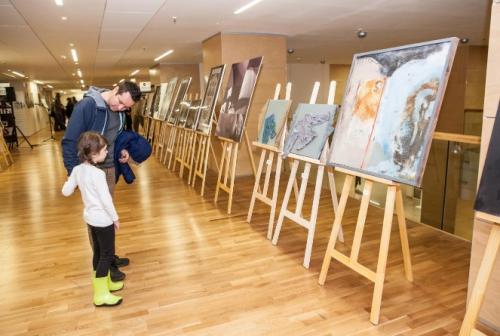
In its new phase, the EHRI project has 23 partners, of which 11 are new. In this article, one new partner, the "Elie Wiesel" National Institute for the Study of the Holocaust in Romania, introduces itself.
The “Elie Wiesel” National Institute for the Study of the Holocaust in Romania is a governmental institution, located in Bucharest, founded in 2005.
The “Elie Wiesel” Institute conducts research projects and coordinates educational, cultural and commemorative activities, aiming to prevent anti-Semitism, Holocaust denial and to raise public awareness regarding the consequences of intolerant behaviours such as discrimination, racism and xenophobia.
Its main activities consist of:
- Carrying out studies and research in Romania or abroad aiming to deepen knowledge about the Holocaust;
- Purchasing or receiving any evidence, publication or document on the Holocaust or related to this subject;
- Establishing an archive containing publications, books, collections of magazines, newspapers, and other written material related to the Holocaust in Romania, offering new working tools in the field;
- Supporting the editing, printing and publication of memoirs, books, studies, articles, correspondence, photographic and video collections of documents, photo albums concerning the Holocaust;
- Launching oral history projects in order to keep alive the memory of the Holocaust and its victims;
- Organizing cultural, educational and commemorative activities on the Holocaust.
The “Elie Wiesel” National Institute for the Study of the Holocaust in Romania has several departments, such as: research and editing, education and communication, library and archive, administration and accounting.
Library and archive
The most important and complete archive containing official documents on the Holocaust in Romania is owned by the „Elie Wiesel” Institute. In our collection, researchers can find over 1 million documents that come from the main archival sources regarding the Holocaust in Romania like: the National Archives of Romania, the archives of the Council of Ministers, ministerial archives, the Intelligence Service archives, and the Archives of the Romanian Jewish Federation.
Researchers, both Romanian and from abroad, are given on-site access to the archive and also to the specialized library containing academic literature on the subject; over 400 BA, MA, and PhD students, as well as national and foreign researchers, accessed the Library and Archive since its creation.
Research and editing
The Research Department conducts projects in a broad area of subjects related to the Holocaust in Romania, funded from national and international sources, in cooperation with different institutions and organizations from Romania and abroad. “The Reconstruction of Holocaust Public Memory in Post-communism”, financed by the Ministry of Education and Scientific Research or “The Forced Labour of Jews during the Holocaust in Romania” are such projects. This last project concluded in the publication of a volume containing 245 documents relevant for this subject.
Since its establishment, the “Elie Wiesel” Institute has published a series of studies and volumes that play an important role in the field of Holocaust research in Romania. One of the latest volume is The Iași Pogrom by Radu Ioanid, a photo album with archive images which document the tragic events that occured in Iași in June 1941. The volume was also published in France recently by the Calman-Lévy publishing house.
Holocaust. Studies and Research, the annual journal published by the `Elie Wiesel` Institute, gathers some of the most important interdisciplinary studies authored by national and foreign scholars. The journal is indexed by international data bases suchs as ERIH PLUS, EBSCO Publishing, CEEOL (Central and Eastern European Online Library).
The studies carried out by the ”Elie Wiesel” Institute are dedicated to aspects such as: everyday life and survival strategies of Jews during the Holocaust, oral history, analysing the relationship between perpetrators and victims, the violence practiced by different institutions during the 1941`pogroms etc. Also, the Holocaust reception, the denial or the minimization are topics of interest for ”Elie Wiesel” Institute`s researchers.
Throughout time, the Institute published a series of thematic volumes which aims to make available archival documents on the history of the Holocaust in Romania.
Cultural and educational projects
Education represents one of the most important tools in preventing tragic historical episodes such as the Holocaust. With this view, since 2008, the “Elie Wiesel” Institute organizes trainings on topics such as the fight against anti-Semitism, xenophobia and racism, and seminars about Holocaust, dedicated to high school teachers. The courses are accredited by the Ministry of National Education.
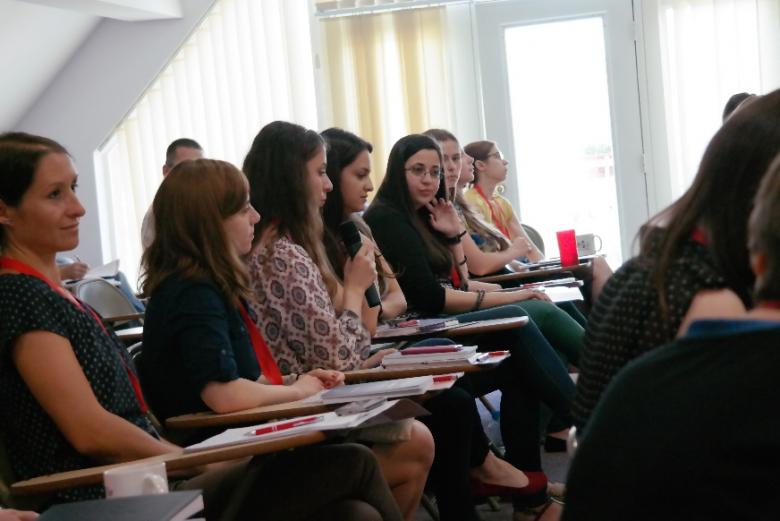
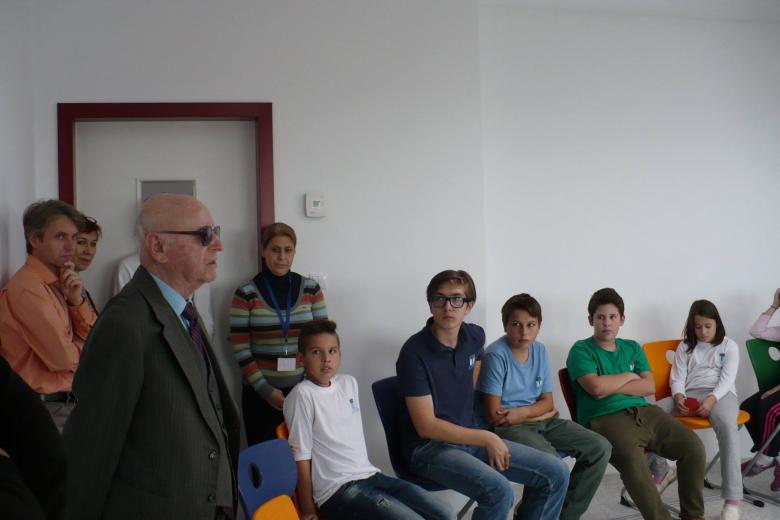
Left: Scholars attending the summer school "The Holocaust in Romania between reception and forgotten", organised in July 2015.
Right: Students meeting a Holocaust survivor on the occassion of the National Holocaust Remembrance Day.
The conferences, seminars, summer schools are also examples of activities carried out by the Institute in the education and communication field.
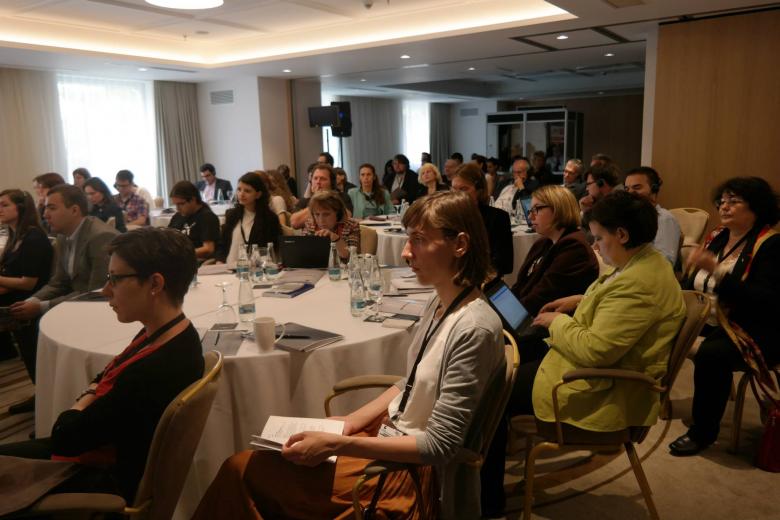
The cultural programs dedicated to Holocaust remembrance are among the most important activities carried out by the “Elie Wiesel” Institute. Exhibitions, art workshops, performance spectacles, film festivals are some of the cultural activities organized or supported so far by the “Elie Wiesel” Institute in collaboration with different partners.
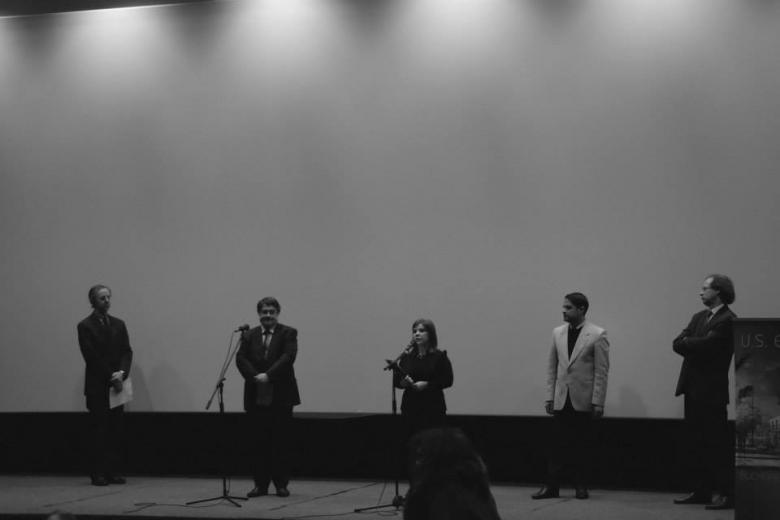
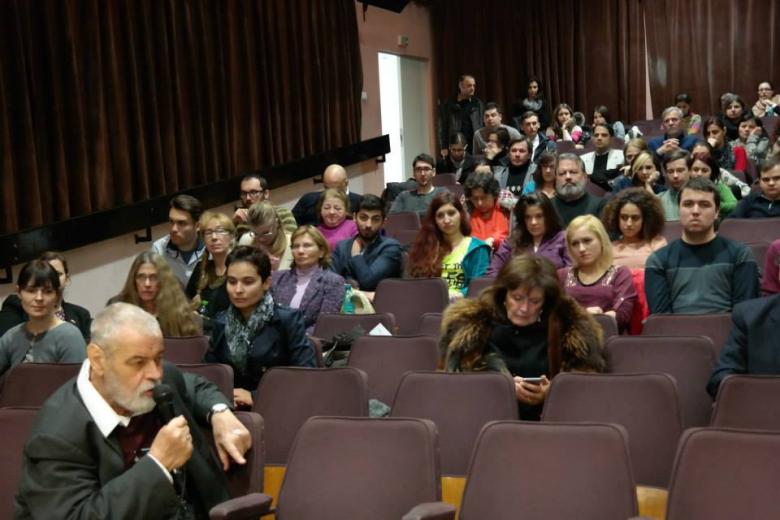
The Holocaust Film Festival, January27-29, 2015, organised with the support of th US Embassy in Romania, on the occasion of the International Holocaust Remembrance Day.
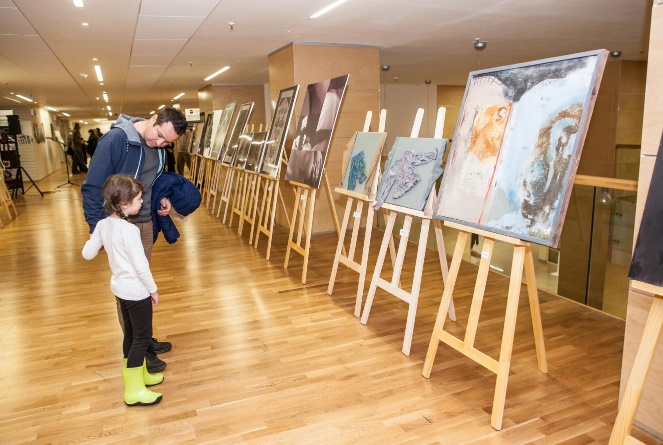
"Witness and testimonies", paintings, graphics and artefacts exhibition, October 2014.
The Holocaust Memorial in Bucharest
Every year, on October 9, the National Holocaust Remembrance Day, the “Elie Wiesel” Institute organizes the wreath-laying ceremony at the Holocaust Memorial in Bucharest. Officials of the Romanian Presidency, Government and Parliament, representatives of the foreign Embassies in Romania, and heads of various national or local institutions attend the ceremony.
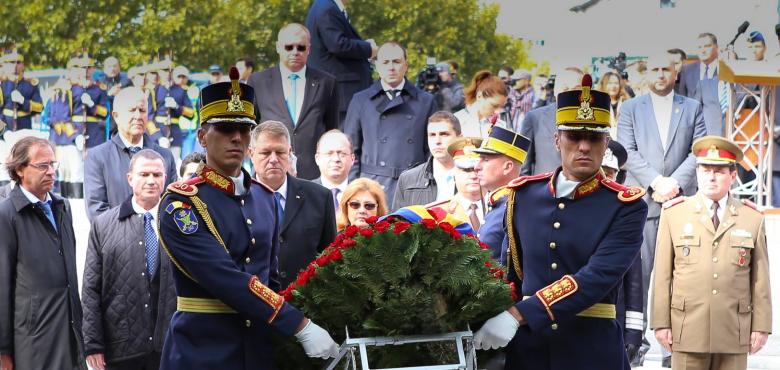
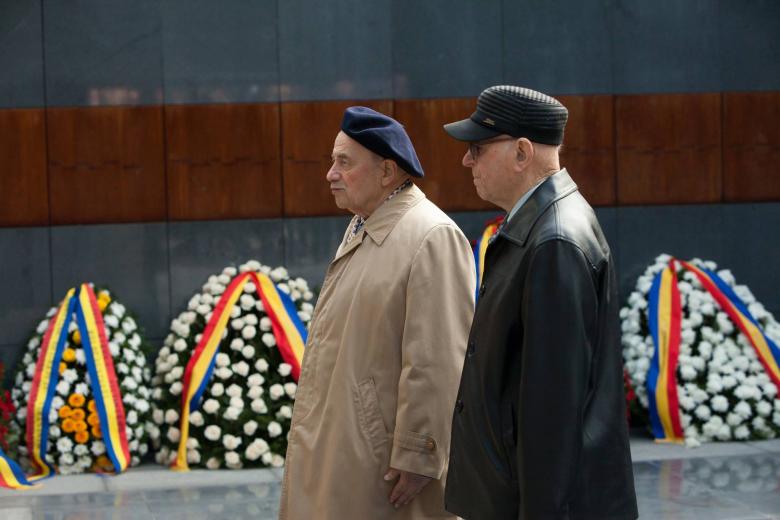
Left: The wreath-laying ceremony organized on the National Holocaust Remembrance Day (October 9, 2015) at the Holocaust Memorial in Bucharest - The President of Romania offering tribute to Holocaust victims.
Right: Holocaust Survivors at the wreath-laying ceremony organized on October 9, 2015, at the Holocaust Memorial in Bucharest.
The Holocaust Memorial in Bucharest was inaugurated in 2009 on the occasion of the National Holocaust Remembrance Day.
The Memorial was built following a recommendation of the International Commission for the Study of the Holocaust in Romania in 2004 as an expression of the duty to acknowledge the crimes committed by the Romanian state against the Jewish and Roma communities during the Second World War.
Following an international competition, the project proposed by sculptor Peter Jacobi was chosen for buiduing the Memorial.
The memorial complex includes the Hall of Names, two installations with desecrated gravestones from Odessa and Bucharest cemeteries, and five sculptures located around the central building: the Memorial Column, Via Dolorosa, the Roma Wheel, the Star of David and the Epitaph.
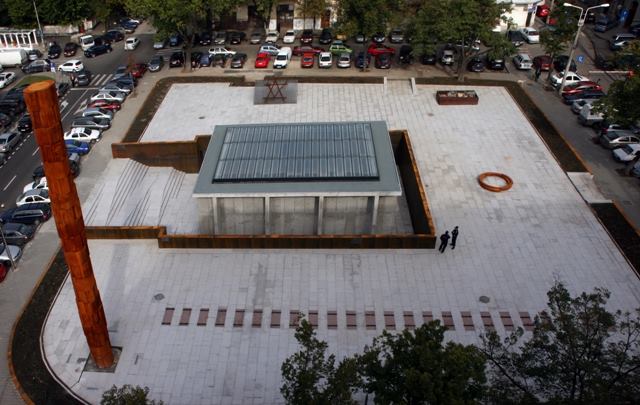
Overview of the Holocaust Memorial in Bucharest
In 2016, Romania marks the 75th Commemoration of the Pogrom in Iasi. Remembrance ceremonies will be organized by the “Elie Wiesel” Institute in Iași and in every place where the Death Trains were stationed.
The Pogrom in Iași is known as one the largest massacres in modern Romania. Before this massacre, the Jews represented half of the population of Iași. This tragedy changed the demographic, social, economic and cultural profile of the city.
The Pogrom took place between 27 and 29 June, 1941 when the local authorities officially accused the Jewish population of helping the Soviet enemies. On the night of June 28/29, Ion Antonescu ordered the deportation of the Jewish population of Iaşi and things escalated as a result of the implementation of this order. Many Jews were killed on the spot or into the courtyard of the Police Headquarters. Later, the Jews were stuffed in two trains, sealed and guarded by soldiers, which became known as the "Death Trains". Because of overcrowding, heat, lack of water and oxygen, thousands of Jews died in those trains. The total number of victims estimated by historians is 14,000.
Some of the most important activities that are carried out in 2016 are represented by the IHRA meetings which will take place in Romania. In 2016, the presidency of the International Holocaust Remembrance Alliance is held by Romania. The “Elie Wiesel” Institute is part of the Romanian delegation to IHRA and will have an important contribution to the meetings that will take place in Bucharest and Iași.
Photo credit: ©INSHR-EW
"Elie Wiesel" National Institute for the Study of the Holocaust in Romania
